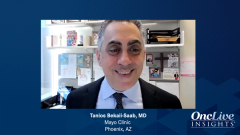
Understanding and Detecting TKI-Specific Hepatotoxicity
Tanios S. Bekaii-Saab, MD, describes the hepatotoxicity commonly seen with tyrosine kinase inhibitors (TKIs) and how to monitor and detect it with aspartate aminotransferase (AST) and alanine transaminase (ALT).
Episodes in this series

Transcript:
Tanios S. Bekaii-Saab, MD: The majority of these tyrosine kinase inhibitors that are approved and are available to us in clinic will induce some level of hepatic injury. Essentially, that’s where they get metabolized and ultimately cleansed out of the system. A lot of these agents end up causing some level of hepatocellular injury—liver cell injury. A lot of these multitargeted VEGF receptor tyrosine kinase inhibitors, like the ones we use in GI [gastrointestinal] oncology: regorafenib, cabozantinib, lenvatinib, sunitinib, sorafenib. There are quite a few. Several of those have been reported to cause hepatoxicity. Some are more significant than others. For example, in our practice, we use regorafenib and sunitinib. The concern was high enough that they ended up with a box-label warning by the FDA. That certainly raises the level of awareness that these agents can significantly increase the risk of hepatotoxicity and, in few cases, liver failure. The concern is not just reversible hepatotoxicity but also, if it becomes irreversible and severe, liver failure.
Thankfully, these are rare events. But when they happen—I’ve seen them happen on incredibly rare occasions, thankfully—they can be quite catastrophic. The best way to prevent those, although they’re not 100% preventable, is close monitoring. Once we see a level of rise that’s concerning, we should make sure to do the appropriate measures. We’ll talk about those in a bit. Hepatotoxicity also has been reported for other tyrosine kinase inhibitors that are in use in practice. All of them can induce it. On a very strict basis, few have box-label warnings thought to cause more severe hepatotoxicity. But all of them have that risk. As an example, if you look at gefitinib vs pazopanib, and you look at the frequency of liver injury, it can range from 11% for gefitinib to 50% with pazopanib. When we look at the risk of liver failure in patients receiving these agents, it could be between 0.5% and 1% of patients treated with regorafenib, cabozantinib, sorafenib, and sunitinib in our practices. The good news is that even in those most severe cases, fatalities are rare.
I want to go back to an understanding of what hepatotoxicity is. As I said, the most common reason for hepatotoxicity is that these agents cause direct cell injury. When you injure the cell, the 2 lab parameters that show up first as elevated would be AST and ALT, so SGOT and SGPT. We routinely measure those in patients who are being treated with these tyrosine kinase inhibitors. Bilirubin, alkaline phosphatase, and others, if they aren’t already elevated because of the risk of from the cancer, come later when there’s significant destruction of liver cells. Ultimately, liver injury can get worse, and then you can start seeing the other parameters show up. The 2 most important lab parameters that would give you the first hint are elevations of AST and ALT following treatment with these tyrosine kinase inhibitors. The cholestasis, which is measured by bilirubin, has been reported. But these do occur following elevation of AST and ALT, not proceeding it, more often than not. Is it possible that we see elevations in bilirubin before AST and ALT? Possibly, in some cases. Any elevation in liver function tests that would not be attributable to the cancer itself should raise a red flag. It’s important to keep an eye on this.
Transcript edited for clarity.




































